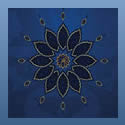Over 150 years ago an educational method was codified by a woman for women in the Sokoto Caliphate, in northwest Nigeria, which was geographically the size of western Europe. Those who actively traveled with the Yan Taru lived within a 50 mile radius. The various jajis brought their students to Sayyida Nana Asmau who taught them using poetry. Sayyida Nana was classically trained in the sciences of Islam. She was hafizat al Qu’ran ( one who memorized the whole book) and fluent in four languages: Arabic, Berber, Fulani and Hausa. She utilized her poetic skills to simplify complex subjects such as aqeedah (theology), fiqh (law) and tazkiyyatul nafs (purification of the soul) for laities. This schooling style was so efficient that during her epoch, most women were able to study. They either traveled as a member of the Yan Taru, or were taught in a home by one of these roving teachers who went house to house to transmit their knowledge.
She utilized her poetic skills to simplify complex subjects such as aqeedah (theology), fiqh (law) and tazkiyyatul nafs (purification of the soul) for laities. This schooling style was so efficient that during her epoch, most women were able to study. They either traveled as a member of the Yan Taru, or were taught in a home by one of these roving teachers who went house to house to transmit their knowledge.
What is noteworthy about the Yan Taru is its conduciveness to the life cycle of a woman. Usually a girl would join as soon as she was old enough to memorize until marriage. She would then be able to easily tackle her new role having studied the foundation of the deen (religion). In addition she was still being tutored at home by the Yan Taru teachers and would send sadaqa to Sokoto via the travelers. As time passes and her children are more independents, she rejoins the Yan Taru, travels, studies and teaches, and this is how the cycle goes.
The Yan Taru as an organized structure started with Sayyida Nana Asmau but this schooling approach has deep roots in that community and the greater Muslim society. The ladies of Sayyida Nana’s house were also scholarly in particular her older sister Khadijah, her grandmother Hauwa and great grandmother Rukayat. Female scholarship has emerged from the time of our beloved Messenger, peace and blessings be upon him, and has continued to this day. At time it is vibrant at other times it is rare, but it is always present. Since each generation needs to learn and transmit Islam and who are the first teachers of humanity except the mothers? Wherefore their education is of the utmost importance.
”Seeking knowledge is obligatory on every Muslim and Muslimah”
The Yan Taru Charitable and Educational Foundation seeks to follow this tradition of scholarship and charitable works.

